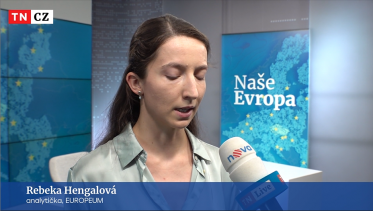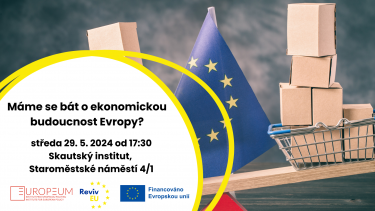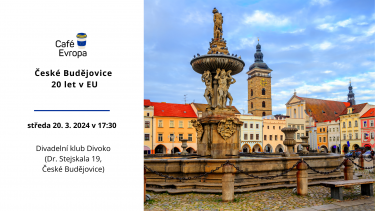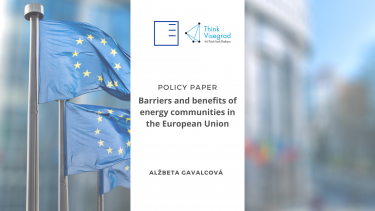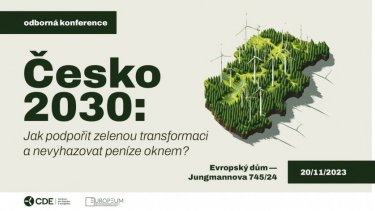TV Nova | How does the Czech public view climate change and the development of renewable energy sources?
Before the upcoming elections to the European Parliament, a debate was held on TV Nova among the leading figures of the seven main political parties, movements, and coalitions. Discussions revolved around important issues such as the migration pact or the conflict in Ukraine. Rebeka Hengalová, a research fellow at EUROPEUM Institute, provided an analysis for TV Nova on how the Czech public views climate change and the development of renewable energy sources.
Zjistit víceRevivEU | Should we fear for the economic future of Europe?
We invite you to a public podcast recording focusing on the discussion of the impacts of the COVID-19 pandemic on European industrial policy and its potential consequences for the Czech economy and society. We will discuss the new technological dynamics resulting from the pandemic and explore ways in which the European Union can respond to technological competition with the USA and China.
Zjistit víceCafé Evropa: České Budějovice 20 years in EU
We invite you to the next debate of the Café Evropa series. Come and talk to us about what current european issues are resonating in České Budějovice and how you imagine Europe. Are you interested in nuclear energy, electromobility, euro, local projects supported by the EU, culture or any other european topics?
Zjistit vícePolicy Paper | Barriers and benefits of energy communities in the European Union
Energy communities are an effective means to decentralize and renew our energy systems with sustainable solutions as they are usually based on renewable energy. They have already started emerging in 1970´s, yet there has been a significant increase in their development only in recent years, also in terms of their introduction into the EU legislation. Especially in Western and Northern European countries the concept already enjoys vast popularity. On the other hand, in Central and Eastern European countries (further referred to as CEE) energy communities are only beginning to emerge. The policy brief (based on literature and interviews with various stakeholders ) examines the benefits energy communities may bring, and more importantly, the main obstacles remaining in their way for greater evolution in the CEE region – and especially Visegrad countries (V4). As these initiatives progress, sharing the best practices will ensure the success of the community energy in the energy transition. Writes Alžbeta Gavalcová.
Zjistit vícePolicy Paper | Barriers and benefits of energy communities in the European Union
Energetické komunity jsou účinným prostředkem decentralizace a obnovy našich energetických systémů pomocí udržitelných řešení, protože jsou obvykle založeny na obnovitelné energii. Začaly se objevovat již v 70. letech 20. století, avšak k jejich výraznému rozvoji došlo až v posledních letech, a to i z hlediska jejich zavedení do legislativy EU. Zejména v zemích západní a severní Evropy se tato koncepce již těší velké oblibě. Naproti tomu v zemích střední a východní Evropy (dále jen SVE) se energetická společenství teprve začínají vytvářet. Tento politický brief (založený na literatuře a rozhovorech s různými zúčastněnými stranami ) zkoumá výhody, které mohou energetická společenství přinést, a především hlavní překážky, které jim stále stojí v cestě k většímu rozvoji v regionu střední a východní Evropy - a zejména v zemích Visegrádské skupiny (V4). Jak tyto iniciativy postupují, sdílení osvědčených postupů zajistí úspěch komunitní energetiky v energetickém přechodu. Píše Alžbeta Gavalcová.
Zjistit víceCzech Republic 2030: How to support green transformation and not throw money out the window?
On 20 November 2023, the Centre for Transport and Energy, in cooperation with EUROPEUM Institute for European Policy, organised a conference entitled Czech Republic 2030: how to support green transformation and not throw money out the window? The conference was opened with an introduction by Josef Schwarz from the Representation of the European Commission in the Czech Republic.
Zjistit víceRILSA | The uncertain fate of the Green Deal for Europe ahead of the European Parliament elections
Farmers' protests have reminded that the measures of the Green Deal for Europe may not be politically viable for Europeans. To make climate policies politically viable, the EU should therefore focus on its commitment not to leave anyone behind in the green transition. Klára Votavová, a researcher at EUROPEUM Institute for European Policy, discusses the current development of the Green Deal for Europe and its social policy aspects in an expert publication for the Social Policy Forum.
Zjistit víceINVITATION | TAPF: Taking Stock of Transatlantic Relations
We would like to invite you to an event titled "Taking Stock of Transatlantic Relations", organized by EUROPEUM Institute for European Policy, the Atlantic Council, and the American Embassy in Prague as part of the Transatlantic Policy Forum conference. The discussion will take place on Thursday, 2. November at 15:00 in the American Centre in Prague.
Zjistit více
Policy Paper | 2024 and Beyond: How to Future-proof the Transatlantic Alliance
In their analysis, researchers Danielle Piatkiewicz and Hugo Blewett-Mundy delve into the most recent obstacles confronting transatlantic security, particularly within the backdrop of Russia's war against Ukraine. They emphasize the imperative of addressing geopolitical challenges while simultaneously striving for strategic independence in economic and energy matters, all the while preserving the common democratic principles that unite these allies. The paper also anticipates the upcoming hurdles in 2024, including a significant election year and the necessity for the transatlantic relationship to fortify its determination for the future.
Zjistit více PDFPolicy Paper | 2024 and Beyond: How to Future-proof the Transatlantic Alliance
Our researcher Danielle Piatkiewicz contributed to an analysis looking at the latest obstacles facing transatlantic security, particularly against the backdrop of Russia's war against Ukraine. The focus is on the need to address geopolitical challenges while pursuing strategic independence on economic and energy issues, all while maintaining the common democratic principles that bind these allies together. The document also anticipates the obstacles ahead in 2024, including a significant election year, and the need for the transatlantic relationship to strengthen its resolve for the future.
Zjistit víceStaroměstské náměstí 4/1
Praha 1 - Staré Město
110 00
tel.: +420 212 246 552
email: europeum@europeum.org
https://www.europeum.org
